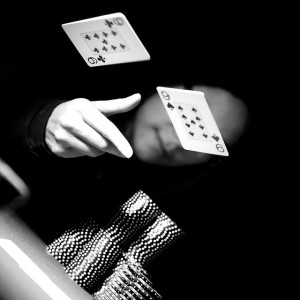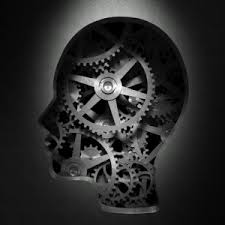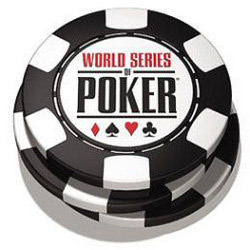At college I played on the football team. Now this isn’t exactly a bragging right in England where football is not nearly as big as it is over in the US, but nevertheless I loved the game and was fairly good at it. There was one guy on the team who struggled. He trained hard, listened to the coaches and put in a lot of effort but he just wasn’t a football player. He was undersized, lacked coordination and didn’t have an aggressive bone in his body. He stayed on the team, because here in the UK we don’t let a small thing like lack of talent get in the way of a man’s dreams, but even with our liberal Wide Receiver rotation, he didn’t get any play time to speak of and spent all his time on the sidelines as effectively as cheerleader in full kit.
2005 – Poker is going through a huge boom. More people than ever are playing both in card rooms and on the Internet, and it has become not only socially acceptable but also ‘cool’. In the last year, I have had lots of friends and work colleagues asking me about online poker and how to get into the game. People who five years ago would never have considered playing poker are now taking up the game and that’s great.
Most of the time.
But a poker player, like a football player, requires certain skills and traits to be successful. For the most part poker is a very inclusive sport and most of the skills to become a successful player can be learned through teaching or through practice. However, there are certain people who will never become successful poker players not through lack of effort, but because something about their personality will forever hold them back. These players may still be drawn to the game like moths to a flame, lured by the money that their friends are making (or at least claim to be making), but they will end up disappointed.
The following is a guide to the mental traits that are most likely to hold you back in your quest to be a successful poker player. If you identify too many of these traits in a friend, don’t encourage them to play poker. If you identify too many of them in yourself, reconsider whether poker really is the game for you.
1. A Clinical Aversion to Math
Poker is at base level, a game about numbers. How many outs do you have? What pots odds are you getting? What is your pot equity? How much should you bet to make it unprofitable for draws to call you? What are the chances of being dealt a particular hand? What is the probability of making your hand by the river?
It is not necessary to be a maths genius in order to be a successful poker player, in fact you don’t need any qualifications at all. What you do have to do is at least pay lip service to the numbers. Can you work out how many outs you have? As a result can you work out if a call is profitable? If you can’t then you are going to have huge leaks in your game. Nearly all successful poker players, whether they admit it or not, will use a lot of rudimentary maths in their game. People who get a headache trying to calculate a 15% tip need not apply.
2. Lack of Discipline
Ask a winning poker player what the most important attribute is in order to be successful and discipline nearly always crops up. These days it is easy to get information on how to play well or at least competently, but this is no good at all if you don’t have the patience and discipline to make the plays you know are right. Most winning players only beat the game by a few big bets per hour. A –EV hand played here, a loose call there, a minor bout of tilt somewhere else and you are no longer a winning player. People who are easily bored, action junkies or impulsive are likely to bring these habits to the poker table and are unlikely to be able to adjust to the grind of being a winning poker player.
3. Myopia
Playing successful poker is all about the long term, and it is all too easy to forget this. The fact of the matter is your results over 100 hands, or 500, or 1,000, or even 5,000 are almost irrelevant. Most good players argue that it Is not until you have played over 10,000 hands that you even have a good idea whether you are a winning player or not. While most players suffer from myopia (or ‘short-sightedness’) occasionally, if you are the type of person who is not willing to look beyond your last session you will have big problems as you progress as you will not be able to put your downswings or indeed your upswings in proper perspective. You will find yourself making ill-advised decisions such as moving up a limit too early, changing your game unnecessarily and over or undervaluing certain hands or holdings based upon your short-term results.
4. Emotional Imbalance
Tilt is a very real danger for the poker player. Literally months of hard work can be undone by few hours of tilting. Few players have the ability to play their A-game all the time, but it is important to be able to:
a) Recognise when you are tilting
b) Not let your emotions affect your play too much and
c) Know when to walk away
There have been too many tragic stories of otherwise good players who have gone on tilt and wiped out their bankroll.
On a related issue, you have to be able to separate poker from the rest of your life. While poker players dislike bad beat stories, non poker players dislike them even more. If losing at poker makes you so miserable it starts to interfere with work and your personal life then it is probably not the game for you. There are far less stressful ways to make money.
5. Inability to Handle Large Losses
Playing poker is an emotional rollercoaster. Often you will be dealing with winning and losing large amounts of money, which even if you are properly bankrolled, will often be difficult to handle. A 3/6 player can easily lose $500 in an evening without really doing anything wrong, and this might be a month’s rent for some people. Once you are into the realms of 15/30 you are looking at maybe $2000 for a bad session. If you are the kind of person who can’t handle losing these amounts of money then you may want to stick to the low limits, as these kinds of losses are inevitable and unavoidable. Some people can’t stand the thought of losing money at all, and to these people I recommend a different hobby.
6. Dislike of Randomness
Some people like to be in control, and have predictable results to their actions and unfortunately poker is the antithesis of control and predictability. The cards you receive in any given hand, session or even series of sessions are random. So are the hands you are up against, the flop, the turn and the river. This is the games appeal for some and it’s turn-off for others. Because poker is so random, the results you will get are also random. You can play extremely well and win, or you can play extremely badly and lose. Sometimes you can play well and lose more/win less than you would have done by playing badly with the same cards.
To be a good poker player, you need to accept the randomness of the game and make decisions that will most likely make you a winner in the long term, not allowing yourself to be deterred when short-term results do not go your way. If you can’t accept that you can be the best player at the table and still lose, then you would be better off with a game like chess. Otherwise you will become a player who is forever loitering on the rail and on poker forums boring people with bad beat stories.
7. The Need for Instant Success
People are always looking at ways to get rich quick, and to many people poker looks an ideal way to do this. Online poker sites use clever marketing to convince new players that the keys to being successful at poker are not maths, discipline and experience, but bravery, guts and an ability to read people. Because most people think they are brave, gutsy and good at reading people, lots of people assume they can be successful at poker, and get rich quick.
They won’t.
Very few people achieve any kind of success at poker without putting a lot of work in. Starting of at the lower limits until they build a bankroll, reading and understanding poker theory, reviewing and scrutinising their play to find out how they can improve and playing through the downswings in order to hit a long term aggregate win rate. It is a long journey, and if anything is harder work than trying to get rich through a regular career.
People who start playing poker in the hope of achieving overnight success inevitably leave broke and disappointed. They will play above their bankroll, play loosely and overestimate their own ability. In short, all the things that will make them sitting ducks to be beaten by the real successful players.
8. Ethical issues
One of the side effects of poker coming into the mainstream is that it is becoming more widely accepted (or at least tolerated) by groups that previously thought of it as shady or even evil. However, the game itself has not changed in this time. It is still gambling and still has the same moral implications as it ever did. If you have moral objections to gambling, then poker is obviously not the game for you but it doesn’t stop there. Before you start playing poker, ask yourself the following question:
‘Could you bust your opponent if you knew the money in front of him is all he has and he needs it to buy food to feed himself and his family?’
If the answer is no then don’t play. It sounds harsh but playing winning poker is a very marginal proposition. If you go soft on an opponent you are wiping out your profit margin. Even good internet players generally only win around 2BB per hour, and so even something simple like not raising the river when you are almost certain you are ahead will cost you at least half an hours play.
For some people, playing on the Internet makes this ethical conundrum easier to handle. They can’t see their opponent and so they don’t have to think about who they might be playing against and what their circumstances might be, but this is really only putting the problem to one side. When you reach the higher limits and see someone blow $2,000 in an hour how will you react? What if they leave the table with the comment ‘damn, that was my entire pay-cheque’? How will that make you feel? Unless you are thinking something like ‘I don’t care’ or ‘It’s a shame but it’s not my problem’ you are probably not well suited to being a poker player.
Conclusion
Things worked out okay for my football buddy in the end. He made a few friends, got some exercise on a Wednesday afternoon and had something impressive to tell women in the bar, because a bad football player just has to put up with the frustration of not getting on the field. A bad poker player has to cope with financial losses, often large ones. It is just as important to know what makes a bad poker player as what makes a good one.
Submit your review | |








